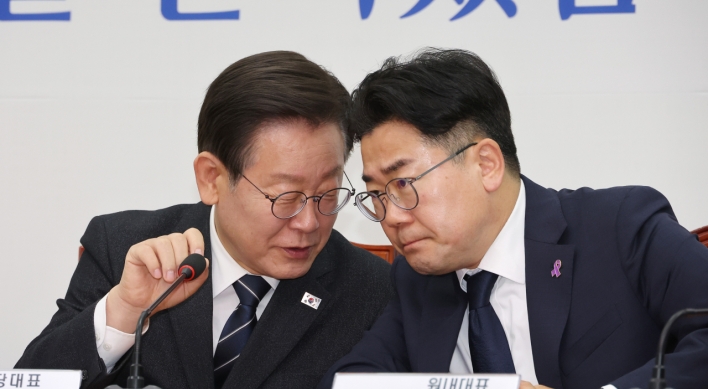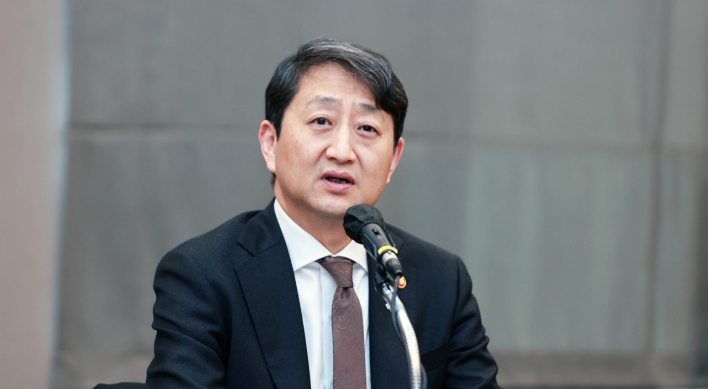Korea, U.S. agree to focus N.K. policies on pressure rather than dialogue
By 안성미Published : Feb. 19, 2016 - 10:38
South Korea and the United States agreed Thursday to focus their North Korea policies on pressure rather than dialogue to make the communist regime understand it has nothing to gain from nuclear and missile development, an official said.
The two sides reached the understanding when Cho Tae-yong, deputy chief of South Korea's presidential national security office, held talks with Deputy Secretary of State Tony Blinken to discuss strategies to deal with Pyongyang in the wake of its nuclear and missile tests.
"There was a consensus between the South and the U.S. that our North Korea policies have pursued a two-pillar approach of pressure and dialogue so far, but we should put more of a focus on the pressure side to send a clear message that the North has nothing to gain from nuclear and missile development," the official said.
The two sides also agreed to put in utmost efforts to make a strong and more effective sanctions resolution at the U.N. Security Council, and discussed unilateral measures to take in addition to U.N. sanctions, the official said on the condition of anonymity.
For more than a month, since the North's Jan. 6 nuclear test, the Security Council has been struggling in negotiations to come up with a new sanctions resolution on the North because China has been reluctant to impose harsh measures on Pyongyang.
Amid the deadlock, the North flouted the Security Council again with a banned missile launch on Feb. 7.
Beijing has condemned the North's nuclear and missile tests but has been lukewarm about calls for a stern response. Analysts have long said Beijing fears that pushing Pyongyang too hard could lead to its collapse, instability on its border and ultimately the emergence of a pro-U.S. nation.
Chinese cooperation is key to implementing a meaningful sanctions resolution as it is one of the five veto-holding permanent members of the U.N. Security Council and the main provider of food and fuel aid to the impoverished North.
"We're now at a point of in-depth consultations where the possibility of adopting a resolution stronger than before is in sight," the official said.
Asked if Chinese cooperation in efforts to pressure the North is tied to the potential deployment of the U.S. THAAD missile defense system to the South, the official said the two matters are separate, and Seoul is considering THAAD according to its own security needs.
In an interview with PBS television on Wednesday, Blinken said that unless China uses its leverage over the North, the U.S. will take steps to ratchet up pressure in our own defense and in defense of our partners, such as deploying THAAD to the South.
The remark touched off speculation that the two issues are linked.
"We have now entered into active consultations with our South Korean partners and allies on the deployment of a THAAD missile defense system, not directed at China. This actually won't affect China strategically," Blinken said.
"They don't see it that way. They view it as a problem. We said, look, if you are not going to take responsibility for helping to deal with North Korea and getting them to change their behavior and engage in meaningful, denuclearization talks, we have to take these kinds of steps," he said.
Blinken also said the U.S. is focused on "getting the strongest possible Security Council resolution but a resolution with real teeth." He called for China to play a greater role, saying there are many areas where China could put the squeeze on the North Koreans and at least "have a chance of getting them to rethink."
"We are making a little bit of progress but, look, I believe at the end of the day they will come around to a strong Security Council resolution," Blinken said. (Yonhap)



![[AtoZ Korean Mind] Does your job define who you are? Should it?](http://res.heraldm.com/phpwas/restmb_idxmake.php?idx=644&simg=/content/image/2024/05/06/20240506050099_0.jpg&u=)














![[K-pop's dilemma] Is Hybe-Ador conflict a case of growing pains?](http://res.heraldm.com/phpwas/restmb_idxmake.php?idx=642&simg=/content/image/2024/05/07/20240507050746_0.jpg&u=)